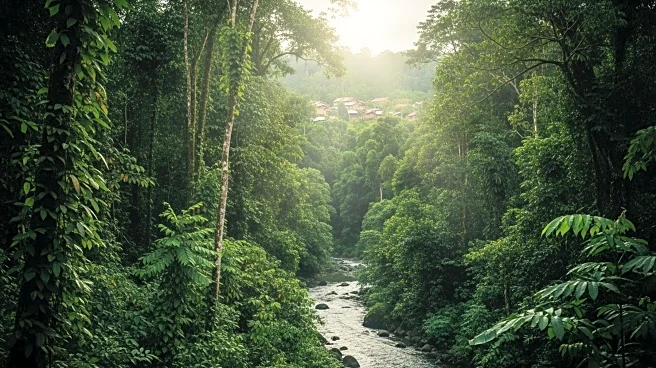What's Happening?
Survival International, an Indigenous rights organization based in London, has released a report highlighting the precarious situation of uncontacted Indigenous groups worldwide. The report identifies
at least 196 uncontacted groups across 10 countries, primarily in the Amazon rainforest. These groups face significant threats from logging, mining, and agribusiness, with nearly 65% threatened by logging alone. The report warns that half of these groups could be wiped out within a decade if governments and companies do not take action. Uncontacted peoples are contemporary societies that avoid outsiders due to historical violence, slavery, and disease. They maintain their own languages and traditions, living by hunting, fishing, and small-scale cultivation.
Why It's Important?
The survival of uncontacted Indigenous groups is crucial not only for their own rights but also for global environmental stability. These communities play a vital role in preserving the Amazon rainforest, which is essential in combating climate change. The threats they face from extractive industries and organized crime could lead to their extinction, which would have dire consequences for biodiversity and climate regulation. Governments and corporations are urged to recognize and enforce Indigenous territories, making them off-limits to destructive activities. Public opinion and pressure are deemed essential in achieving these protections.
What's Next?
Survival International calls for a global no-contact policy, including legal recognition of uncontacted territories and suspension of mining, oil, and agribusiness projects in or near these lands. The report emphasizes the need for stronger laws and a shift in perception, viewing uncontacted peoples as integral citizens of the planet. Governments are encouraged to map and protect these territories from afar to avoid endangering the groups' health or autonomy. Corporations are urged to trace their supply chains to ensure commodities are not sourced from Indigenous lands.
Beyond the Headlines
The report highlights the ethical and legal dimensions of protecting uncontacted Indigenous groups. International law requires free, prior, and informed consent for activities on Indigenous lands, but obtaining consent from uncontacted groups is challenging. The rise of organized crime and evangelical missionary incursions pose additional risks, with past incidents leading to deadly outbreaks and clashes. The protection of these groups is not only a matter of human rights but also crucial for global climate stability.









